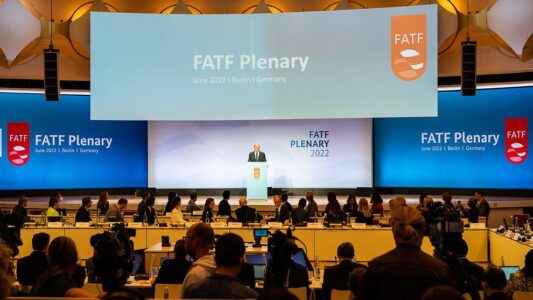
Combating money laundering and terrorist financing
Federal Chancellor Olaf Scholz addressed the plenary of the Financial Action Task Force on Tuesday. The fight against money laundering and terrorist financing “starts at home, at the national level”, he said. The plenary is taking place in Berlin until 17 June.
The Financial Action Task Force (FATF) was established in Paris in 1989 as a global watchdog to clamp down on money laundering and terrorist financing.
As an intergovernmental body, it establishes international standards to put a stop to these illegal activities. The FATF consists of 37 member states, the European Commission and the Gulf Cooperation Council. The two-year German Presidency of the FATF expires at the end of June 2022.
The Federal Government has intensified its efforts in recent years, implementing a wide range of measures against money laundering and terrorist financing:
– Closing gaps in legislation, e.g. in the property sector
– More rigorous reporting obligations for notaries, lawyers, tax advisers
– More effective prosecution based on an updated definition of the criminal offence of money laundering
– Strengthening of the Financial Intelligence Unit to allow reporting of suspicious money flows
– Improvement of the national Transparency Register
“Our aim is to ensure strong, modern and efficient laws and institutions” in the fight against money laundering, said Scholz.
The audit of Germany started in 2020 at almost exactly the same time as Germany took over the Presidency of the Financial Action Task Force.
When it has been completed, a Mutual Evaluation Report (MER) is issued: this is a catalogue of recommendations for action and measures to better combat money laundering and terrorist financing in Germany. The final report will be published in August 2022.
The improved Transparency Register also helps implement sanctions against Russian oligarchs and their assets, including hidden assets. Previously, it was necessary to consult various different lists to determine who the beneficial owner of a house was, for example, or the actual owner of a company.
Now this information is provided in a single list in digital form. Germany will now use this as a basis for establishing a national register for any property that is subject to sanctions or of unclear origin.
The Transparency Register was established in Germany on 27 June 2017 by the Money Laundering Act (GwG). This makes it easier to shed light on the often deliberately complex business constructs, identify front men and track down letterbox companies.
Money laundering and terrorist financing do not stop at national borders, however. “The fight against these criminals can only be won if we work together – both within Europe and worldwide,” warned Federal Chancellor Scholz.
For this reason, the Federal Government will continue to support and encourage the FATF to further refine its standards. A global transparency register that discloses who actually ultimately benefits from profits or is behind properties would be “a quantum leap”, said Scholz. The G7, of which Germany currently holds the Presidency, is committed to doing just this.
At the European level, Germany is campaigning for the closure of legal loopholes and the harmonisation of the legal framework within the EU. One key proposal is to create a new European authority for money laundering supervision (AMLA).
This authority would have direct supervisory powers over risk-prone, financial institutions in the EU and all European countries. The Federal Government would like the new authority to be based in Frankfurt am Main.
Source: Bundesregierung





